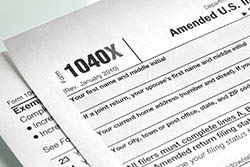
nce a tax return is filed, most people breathe a little easier. But it's not uncommon to realize too late that something was left off a return, figures were misreported or some other error was made. Accuracy is essential, but, depending on the type of error, an amendment may not be required.
Reasons to amend
Generally, you should amend only to correct reported items such as filing status, dependents, income, deductions or credits.
For example, you should file an amended return if:
- You would have benefited from filing as head of household instead of single,
- You incorrectly reported your number of dependents,
- You received additional or corrected W-2s or 1099s after filing, or
- You realized you qualified for a deduction or credit you didn't claim.
Filing an amended return may also be beneficial if Congress passes retroactive tax law changes that affect your return.
Errors that don't call for an amendment
You don't need to amend your return for math errors - the IRS will correct them. Also, if you forgot to attach a W-2 or schedule, the IRS will request the missing documents directly.
If you get a CP2000 notice (noting underreported income based on discrepancies between what the IRS has on file and what you reported), you shouldn't need to file an amended return to report that income, even if there are corrections to the adjustments proposed by the IRS.
What and when to file
In general, you can file an amended tax return (Form 1040x) and claim a refund within three years from the date you filed your original return or within two years of paying the tax - whichever is later. For example, if you filed your 2024 tax return on April 15, 2025, you'll have until April 15, 2028, to file an amendment.
Some exceptions allow more time. For instance, if you're claiming a bad debt, the statute of limitations is seven years from the tax return's due date for the year the debt became worthless.
You also may have an extended deadline if you were affected by a federally declared disaster or are eligible for other exceptions.
File a separate form for each year you're amending and include all relevant forms and schedules. You can amend a return more than once.
We're here
Amending your federal return may also require amending your state return(s). Other tax implications may apply. Contact us for help.
